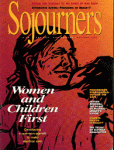Hoping to broaden my perspective on my generation, I helped launch a new local magazine called Generation Next. Its purpose is to provide a public forum for 20-to-30-year-olds to express thoughts and opinions. It is my first regular interaction with secular peers since college. And it is also a way of continuing with the broader generational issues that had been raised for me while working on the November 1994 issue of Sojourners("A Generation's Faith").
Recently I met author Paul Rogat Loeb at a reception for his new book, Generation At the Crossroads. During his talk I quickly picked up on his enthusiasm and genuine interest for the people of my stereotyped generation. I felt hopeful and excited to be in my 20s, and I gained a little more understanding of my peers.
For other Xers who don't have the opportunity to meet Paul Loeb, or the time or resources to seek out new groups, Generation At the Crossroads is an excellent short course. While most profiles adopt simple stereotypes, Loeb's book avoids that, offering something about the "20-something" generation that doesn't insult or patronize.
From 1987 through 1993, Loeb conducted extensive interviews with students on more than 100 campuses in 30 states. He explored the beliefs and values that made some students become activists, while others became complacent adapters. Loeb observes, "I found false the images of a generation almost innately deficient, as if missing some key gene for concern." Loeb's discoveries-the complex myriad of beliefs, attitudes, and actions-are derived from direct encounters with real people. His presentation is unpretentious, if not always objective, and his use of anecdotes, references, and statistics are insightful, sensitive, and personal.
In the latter section of his book, Loeb looks at how the shifts in local and world politics and economies, as well as widespread conservative backlash, continues to impact, shape, and sometimes inhibit the activist climate for today's "20-somethings." Genera-tion At the Crossroads pulls the reader into the thoughts and lives of the students Loeb interviewed in a way that breaks down defenses and stereotypes.
Generation At the Crossroads is for people of faith looking for an understanding of the present "20-something" generation, as well as for insight into the future.

Got something to say about what you're reading? We value your feedback!